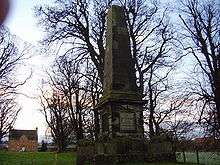James Gardiner (British Army officer)
Colonel James Gardiner (11 January 1688 – 21 September 1745) was a Scottish soldier who fought in the British Army, including during the 1745 Jacobite rising, in which he was killed at the Battle of Prestonpans.[1]
.jpg)
Life
Gardiner was born at Carriden, educated in Linlithgow, and joined the army at the age of fourteen. He served with distinction in several battles and was promoted through the ranks to Colonel in 1743.[2]
Known as a rake in his youth, Gardiner had a religious experience in 1719 and became devout.[3] In 1726 he married Frances Erskine, daughter to David Erskine, 9th Earl of Buchan; five of their 13 children survived to adulthood.
During the Battle of Ramillies he was shot through the mouth and nearly killed by a French soldier who had returned to plunder the dead. However, Gardiner was spared after being mistaken for a French soldier.[4]
At the Battle of Prestonpans he was mortally wounded by the Highlanders after his dragoons had fled the field and he was attempting to rally some foot soldiers. He received a mortal blow whilst wounded on the ground and was stripped to the waist as his possessions were looted by the Highlanders. After the battle Gardiner was carried from the field by a servant to nearby Tranent where he soon died. By a quirk of fate Gardiner lived close to the battlefield in Bankton House.[5]

Memorials
An influential biography was written by Philip Doddridge. He is commemorated locally with a memorial obelisk, erected by public subscription in 1853 in the grounds of Bankton House. A late twentieth century monument on the battlefield marks approximately where he fell. The play, Colonel Gardiner: Vice and Virtue, written by playwright Andrew Dallmeyer was performed as part of Prestonpans' 2009 Homecoming celebrations.[6] He features as a character in Walter Scott's novel Waverley, in which Edward Waverley briefly serves as an officer in his dragoon regiment towards the start of the Jacobite uprising.[7] In the novel he is described as "tall, handsome and active, though somewhat advanced in years".[8]
References
- "Col. James Gardiner". Cite journal requires
|journal=(help) - "Significant Scots James Gardiner". Electric Scotland.
- The account by Doddridge of Gardiner's conversion is quoted at length and compared to the story of Saint Eustace in an endnote to the saint's story in Gesta Romanorum.
- "Colonel James Gardiner - Roger Fay". Evangelical Times. August 1998.
- "The Fight of Faith: lives and testimonies from the battlefield" Bray,P./Claydon,M. (Eds) Ch 3 p39(Cook, F.): London, Panoplia, 2013 ISBN 978-0-9576089-0-0
- Rudden, Liam (24 July 2009). "Vice and virtue of Gardiner". Edinburgh Evening News. Retrieved 1 March 2015.
- Scottish Places website
- Sir Walter Scott: Waverley I, ch VII
External links
| Wikisource has the text of the Nuttall Encyclopædia article Gardiner, Colonel James. |
- Gutenberg Project: The Life of Col. James Gardiner by Philip Doddridge
- Full biography at Electric Scotland
| Military offices | ||
|---|---|---|
| Preceded by Humphrey Bland |
Colonel of Gardiner's Regiment of Dragoons 1743–1745 |
Succeeded by Francis Ligonier |